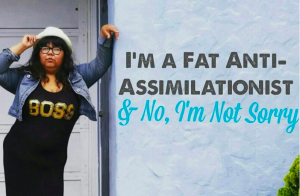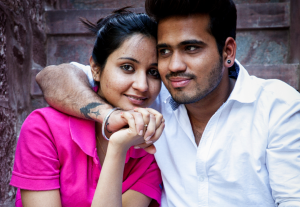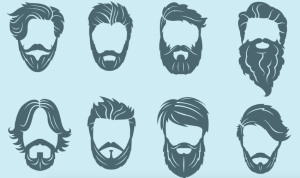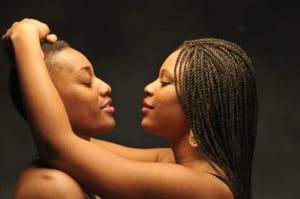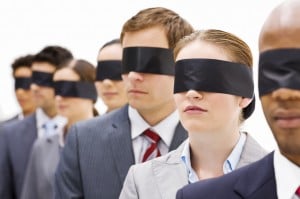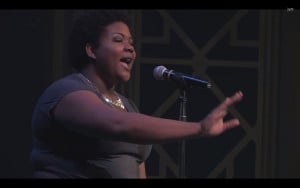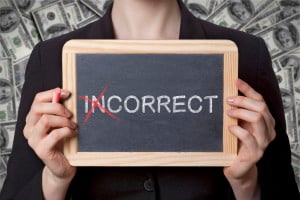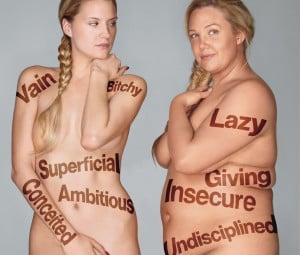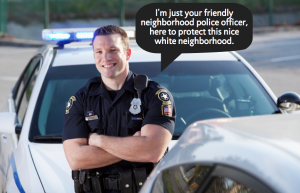Originally published on Melissa A. Fabello’s YouTube channel.
So, I’ve been doing a lot of thinking lately. (Oh. Hi, by the way.) About eating disorders (surprise!), but more specifically, I’ve been doing a lot of thinking lately about the way that eating disorders are portrayed in mainstream media and how pop culture tells a whole lot of half-truths about what life with an eating disorder is really like.
And by “I’ve been thinking about it,” I mean “it’s been making me really fucking mad.”
There’s this really prevalent narrative arc that exists in pretty much every eating disorder story that garners significant attention. And it tends to look like this:
Well-to-do, young white woman develops an eating disorder, often in relation to grappling with childhood trauma or growing up with difficult or destructive parents.
Well-to-do, young white woman, after spiraling into near-oblivion, seeks treatment for her eating disorder, which usually results in her being admitted into a residential facility, and eventually commits to finding her Self again with a new sense of hope on the road to recovery.
And that’s cool and all – if you fit into that box. Which most people don’t.
And the problem with every eating disorder story that we hear fitting into the aforementioned description is that then we buy into them. We use them as examples to hold our own disorders up to. We use them to judge and determine what is and isn’t “really sick.”
We start to trust that these narratives represent “real” eating disorders, and that experiences that fall outside of these confines just don’t count.
And that’s dangerous.
So I’m in the process of working with NEDA (that’s the The National Eating Disorder Association) to curate an anthology that reflects recovery stories that fall outside this dominant paradigm. Which is awesome!
But in the meantime, I want to give you this (very shareable, by the way) list of Ten Things I Wish People Knew Understood Eating Disorders. You ready?
1. Eating disorders do not discriminate.
There’s this really destructive myth that eating disorders only happen to – well – as I said before, young, well-to-do white women.
But it’s a lie!
It doesn’t matter if you’re a dude or a person of color or someone in the queer or trans* community. It doesn’t matter if you’re a person without a whole lot of money, or someone who doesn’t live in the Western World.
Your religion, your age, your ability, your education, your employment status, your family dynamics, your favorite color – none of it matters.
An eating disorder can strike anyone.
2. There are more than two eating disorders.
Generally, when people refer to eating disorders as a whole, they’re secretly really only referring to anorexia and bulimia nervosas.
As if there aren’t all sorts of disordered eating behaviors that happen between and beyond.
As if there aren’t subtypes of those two disorders.
As if Binge Eating Disorder just doesn’t exist.
All eating disorders are serious, and all eating disorders deserve attention.
3. Eating disorders are mental illnesses with physical side effects.
That means that they can’t be simplified into their physical side effects. Anorexia isn’t defined by restricting calories. Bulimia isn’t defined by purging intake. Binge eating disorder isn’t defined by eating large quantities of food.
At the end of the day, eating disorders aren’t really about food. They’re so much more complicated than that. And when you try to simplify them, you really do a disservice.
4. Eating disorders do not determine your body type.
You can dangerously restrict calories and not be “thin.” You can binge and still be “thin.”
Assuming that everyone with an eating disorder must look a certain way – usually mistaken to mean that anyone who restricts or purges must look skeletal and anyone who binges must be fat – only leads to people who need help not getting help.
5. Similarly, your body type doesn’t determine having an eating disorder.
The poorly thought out “joke” of casually tossing questions like “What are you, anorexic?” at thin people or assuming that anyone who is “overweight” (which is a ridiculous term in the first place) must have an unhealthy relationship with food is damaging – not only to the psyches of the people whose feelings you’re directly hurting, but also to the eating disorder community as a whole.
6. Eating disorders are not a choice.
No one wakes up one day and says, “You know what would be really fun? Putting myself through hell.” No one does that.
Eating disorders choose you. And as such, giving “advice” like “Just eat!” really isn’t helpful.
You can’t tell a depressive to just “cheer up.” You can’t tell someone with an anxiety disorder to just “relax.”
You can’t tell someone with an eating disorder to just choose not to have an eating disorder.
7. Eating disorders are not diets.
…Why do I even have to say that?
8. Recovery is a long, hard process.
It has to be deliberate.
And it’s a battle every single day.
But it’s so worth it. And it is possible.
9. Recovery doesn’t look the same for everyone.
Just like eating disorders differ person to person, recovery processes do, too. There is no perfect recovery, and a relapse isn’t a failure.
Every day that you wake up and say “To hell with you, eating disorder!” you’re already winning.
10. Eating disorders matter.
Raising consciousness about them is important.
And if the current coverage of eating disorders – either in the media or in the psych field itself – doesn’t represent your struggle, you’re allowed to be angry. And I encourage you to speak up.
Because your experience is valid, and your voice matters.
So, if you’d like to contribute your eating disorder story to my personal narrative project, check the video information box for directions. And join me – along with a bunch of other awesome panelists – for the #AdiosED chat hosted by Adios Barbie and NEDA on Monday, 2/24, from 8-9pm ET.
Until next time…
Want to discuss this further? Login to our online forum and start a post! If you’re not already registered as a forum user, please register first here.
Melissa A. Fabello, Editor of Everyday Feminism, is a domestic violence prevention and sexuality educator, eating disorder and body image activist, and media literacy vlogger based out of Philadelphia. She enjoys rainy days, Jurassic Park, and the occasional Taylor Swift song and can be found on YouTube and Tumblr. She holds a B.S. in English Education from Boston University and an M.Ed. in Human Sexuality from Widener University. She can be reached on Twitter @fyeahmfabello. Read her articles here and book her for speaking engagements here.
Search our 3000+ articles!
Read our articles about:
Our online racial justice training
Used by hundreds of universities, non-profits, and businesses.
Click to learn more





